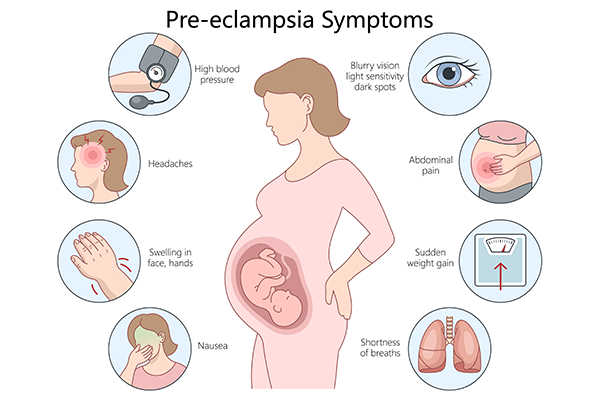
Pregnancy is a beautiful journey, but it can come with unexpected health challenges. One such condition that expecting mothers need to be aware of is preeclampsia. Knowing what preeclampsia is, recognising its symptoms, understanding what causes preeclampsia, distinguishing it from related conditions, and knowing about preeclampsia treatment options can make a crucial difference for both mother and baby. Our expert Obstetrics and Gynaecologists in Delhi-NCR emphasise early detection and comprehensive care to manage this potentially serious pregnancy complication effectively.
Synopsis
What Is Preeclampsia?
What is preeclampsia? Preeclampsia is a pregnancy-related disorder characterised by high blood pressure and damage to organs, most often the liver and kidneys, that typically occurs after 20 weeks of pregnancy. It affects approximately 5-8% of pregnancies worldwide and can progress rapidly without treatment.
This condition requires immediate medical attention because it can lead to severe complications, including eclampsia (seizures), organ failure, or problems with the baby’s growth. Understanding what preeclampsia is is the first step to safeguarding maternal and fetal health, and our Obstetrics and Gynaecologists in Delhi-NCR are dedicated to guiding patients through diagnosis and treatment.

Recognising Preeclampsia Symptoms
Identifying preeclampsia symptoms early is vital for timely intervention. Common signs include:
-
High blood pressure (above 140/90 mm Hg)
-
Sudden swelling of face, hands, or feet (oedema)
-
Excessive weight gain over a short period
-
Severe headaches
-
Visual disturbances such as blurred vision or spots
-
Upper abdominal pain, especially under the ribs
-
Nausea or vomiting beyond the first trimester
-
Reduced urine output or shortness of breath
Because some of these symptoms can be subtle or mistaken for typical pregnancy discomforts, regular prenatal check-ups with experienced Obstetrics and Gynaecologists in Delhi-NCR are essential for monitoring blood pressure and protein levels in urine, two key preeclampsia indicators.
What Causes Preeclampsia?
Despite extensive research, the precise cause of preeclampsia remains unclear. However, experts agree that it results from abnormal placental development and blood vessel formation, leading to poor circulation and high blood pressure. Certain factors increase the likelihood, including:
-
First pregnancy or new partners with each pregnancy
-
History of preeclampsia or family history
-
Chronic hypertension or kidney disease
-
Diabetes or autoimmune disorders
-
Multiple pregnancies (twins, triplets)
-
Obesity and advanced maternal age (35 years or older)
Our Obstetrics and Gynaecologists in Delhi-NCR carefully assess and counsel patients with these risk factors, using advanced prenatal screening to detect preeclampsia early.
Difference Between Eclampsia and Preeclampsia
Understanding the difference between eclampsia and preeclampsia is critical.
Preeclampsia is characterised by high blood pressure and signs of organ damage during pregnancy, while eclampsia is a severe progression involving seizures in a woman with preeclampsia.
Eclampsia is a medical emergency requiring immediate hospitalisation and intensive management to prevent maternal and fetal mortality. Our Obstetrics and Gynaecologists in Delhi-NCR highlight the importance of early treatment of preeclampsia to prevent progression to eclampsia.
Preeclampsia Treatment: Managing the Condition Safely
The goal of preeclampsia treatment is to protect both mother and baby while preventing complications. Treatment depends on the severity of the condition and the pregnancy stage:
-
Mild preeclampsia: Careful monitoring of blood pressure, urine tests, and fetal well-being. Rest and reduced physical activity may be recommended.
-
Severe preeclampsia: Hospitalisation for close observation, medications to control blood pressure, and corticosteroids to mature the baby’s lungs if early delivery is anticipated.
-
Delivery: The only definitive cure is delivering the baby. Timing balances the risks of early birth against dangers to the mother and fetus from ongoing preeclampsia.
Our Obstetrics and Gynaecologists in Delhi-NCR provide personalised management plans tailored to each patient’s condition, ensuring the safest outcomes possible.
Preeclampsia in Pregnancy: Monitoring and Prevention
Monitoring preeclampsia in pregnancy involves routine blood pressure measurements and urine analysis from early gestation throughout prenatal visits. Self-awareness of symptoms and prompt reporting are equally crucial.
Preventive strategies include:
-
Maintaining a healthy weight before and during pregnancy
-
Managing chronic conditions like hypertension and diabetes
-
Following prenatal care schedules strictly
-
Eating a balanced diet and staying hydrated
-
Avoiding smoking and alcohol
In some high-risk cases, low-dose aspirin therapy may be advised under medical supervision. Our Obstetrics and Gynaecologists in Delhi-NCR work closely with patients to develop preventive care plans and educate them on recognising early signs.
Conclusion
Preeclampsia is a serious pregnancy condition, but with awareness of what preeclampsia is, vigilant recognition of preeclampsia symptoms, and prompt preeclampsia treatment, risks can be minimised. Our experienced Obstetrics and Gynaecologists in Delhi-NCR are committed to providing expert prenatal care, early detection, and tailored management to ensure the safety of both mother and baby. Regular check-ups and open communication with healthcare providers are vital during pregnancy—if you experience any warning signs, consult our specialists immediately. Your health and your baby’s wellbeing deserve the best care throughout this precious journey.
FAQ's
Preeclampsia is a pregnancy complication marked by high blood pressure and potential organ damage occurring after 20 weeks of gestation.
Symptoms include high blood pressure, swelling, headaches, vision changes, abdominal pain, and sudden weight gain.
It is caused by abnormal placental development affecting blood flow, with risks increasing due to factors like first pregnancies, chronic diseases, and obesity.
Preeclampsia involves high blood pressure and organ damage; eclampsia includes seizures and is a more severe progression requiring emergency care.
Treatment focuses on monitoring, controlling blood pressure, and timely delivery of the baby, with hospitalisation for severe cases.






















 4 Min Read
4 Min Read





.png)
















